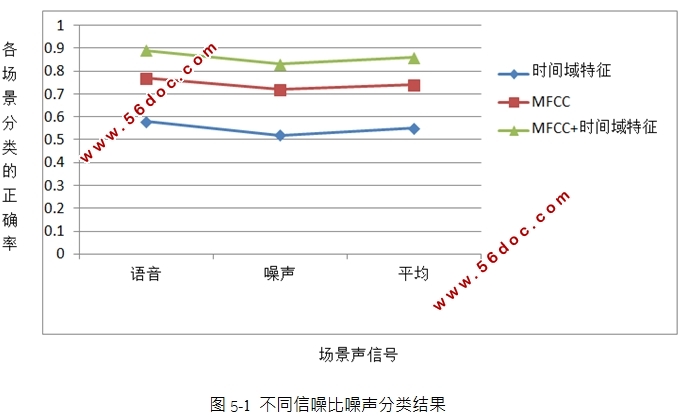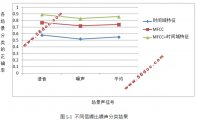基于人工神经网络模型的声音事件识别方法的研究(论文9500字)
摘 要
以前,人类获取信息主要靠书信报纸等,这使得人们获取信息的速度缓慢,质量差。计算机通信和互联网等这些新兴产业都为人类的生活带来了极大的便利。直到这些工具的出现,人类获取信息的途径才被进一步拓宽。不过,互联网信息过于庞大,以致于无法高效且正确的识别出信息的正确与否。而人脑是个强大的信息处理系统。互联网技术远远不能与人脑匹敌。所以,我们必须研究和开发具有类脑特点的智能信息处理工具。这时候,一种新兴技术,即人工神经网络(artificial neural network:ANN)技术,便应运而生了。就是这样一种借鉴人脑信息处理的微观结构,它通过成千上万次的训练,找到了事物之间存在的联系。不仅如此,他还能将系统中的各类事物进行特征的提取,从而成为具有脑式信息处理风格的智能信息处理系统,对输入元素进行推理和归类,从而找到最精确的结果。人工神经网络具有以下优点:(1)具有自学习功能;(2)可以利用反馈网络进行联想储存;(3)高速运算并且找到高质量的结果。这种系统具有训练性、高度并行性、快速判决性、容错性等特点, 适用于语音信号的处理[1]。
我们知道,数据只能以数字信号的方式传入计算机系统才能被处理,而需要处理的声音却是以模拟信号的形式传入进人耳的,声音事件识别技术(Automatic Speech Recognition,ASR)就是一种为了把原始信号转换成数字信号进行处理的技术。在对原始数据进行特征提取后,通过算法计算出数据与信号之间的相似度,进而得到最接近的语句。
本论文主要研究:1、人工神经网络的特点及应用;2、声音识别技术的原理和算法;3、基于人工神经网络模型的声音事件识别方法的研究4、系统实现与实验结果;
关键词:声音事件识别;人工神经网络;特征分析
Research on sound event recognition method based on artificial neural network model
Abstract
In the past, people mainly rely on letters and newspapers to obtain information, which makes people get information slowly and with poor quality. Computer communication and Internet and other emerging industries have brought great convenience to human life. Until these tools appeared, the way of human access to information was further broadened. However, the Internet information is too large to identify the correctness of information efficiently and correctly. And the human brain is a powerful information processing system. Internet technology is far from the same as the human brain. Therefore, we must research and develop intelligent information processing tools with brain like characteristics. At this time, an emerging technology, namely, artificial neural network (ANN) technology, emerged. It is such a kind of micro structure which can be used for reference to human brain information processing. Through thousands of training, it finds the relationship between things. In addition, he can extract the features of all kinds of things in the system, and become an intelligent information processing system with brain style. It can infer and classify the input elements, and find the most accurate results.Artificial neural network has the following advantages: (1) it has self-learning function( 2) The feedback network can be used for associative storage( 3) High speed operation and find high quality results. This system has the characteristics of training, high parallelism, fast decision and fault tolerance, and is suitable for speech signal processing[1].
We know that data can only be processed by digital signal, but the sound to be processed is transmitted to human ear in the form of analog signal. Automatic speech recognition (ASR) is a technology to convert the original signal into digital signal for processing. After extracting the original data, the similarity between the data and the signal is calculated by the algorithm, and the closest statement is obtained.
This paper mainly studies: 1. The characteristics and application of artificial neural network; 2. The principle and algorithm of voice recognition technology; 3. Research on sound event recognition method based on artificial neural network model 4. System implementation and experimental results;
Key words: sound event recognition, artificial neural network, Feature Parameters

目录
第一章 绪 论 1
1.1 研究背景与意义 1
1.2国内外研究现状 1
1.3 基于人工神经网络模型的声音事件特点 1
1.4 本论文安排内容 2
第二章 基于人工神经网络模型的声音事件原理 3
2.1 人工神经网络原理 3
2.2声音事件识别原理 4
2.3本章小结 5
第三章 声音事件识别系统的特征提取 6
3.1时域特征分析 6
3.2 MFCC特征分析 7
3.3本章小结 8
第四章 基于人工神经网络模型的声音事件识别方法的研究 9
4.1神经网络结构 9
4.2学习算法 10
4.3 算法的改进 10
4.4 改进后的算法与之前算法的比较 11
4.5 本章小结 12
第五章 系统实现与实验结果 13
5.1 实验条件 13
5.1.1 软硬件条件 13
5.1.2 实验音频数据库 13
5.1.3 研究目的与步骤 14
5.2 HMM模型实验结果与结论 14
5.2.1 语音与噪声的分类 14
5.2.2 噪声、语音、音乐的分类 15
5.2.3 HMM的状态参数对正确分类率的影响 16
5.3 人工神经网络模型实验结果与结论 16
5.3.1 语音与噪声的分类 16
5.3.2 语音、音乐和噪声的分类 17
5.3.3 人工神经网络参数对正确分类率的影响 18
5.4本章小结 19
第六章 总结与展望 20
致 谢 21
参考文献 22
|



